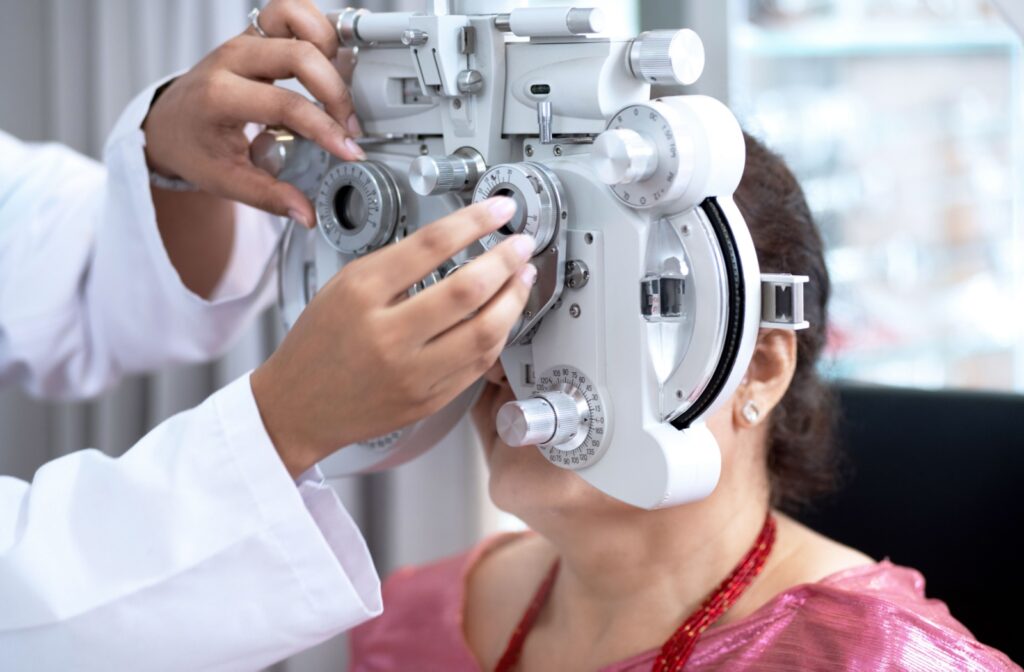Maintaining healthy vision is a crucial part of overall well-being. Yet, eye exams are often overlooked until something feels wrong. Regular eye exams help detect early signs of vision issues and identify health conditions such as diabetes, glaucoma, and even hypertension. Some common tests you can expect during an eye exam in Regina include:
- Visual acuity test
- Refraction test
- Eye muscle function test
- Pupil response test
- Retinal examination
- Tonometry
- Peripheral vision test
There isn’t a one-size-fits-all answer, though. Your eye doctor may recommend more specific testing depending on your situation. For example, if you have diabetes, your optometrist will often recommend dilating eye drops so they can better examine the retina and other internal parts of your eye.
If you’re wondering what to expect at your next appointment, the best person to ask is your eye doctor, who can offer a personalized answer.
Why Are Eye Exams Important?
An eye exam is more than just checking how well you can see. It’s also a check-up for your eye health and a window into other aspects of your overall health.
Many conditions, such as cataracts or vision loss due to diabetes, can develop without symptoms. Regular eye exams allow optometrists to detect these issues early and provide timely treatment, potentially saving your sight.
For Regina residents, staying proactive with eye health care is crucial, especially as modern life increases exposure to screens and digital strain.
Types of Eye Exams
Depending on your vision needs or health concerns, your optometrist may recommend a specific type of exam.
Comprehensive Eye Exams
A comprehensive exam is your all-in-one solution for primary eye care. This type of exam checks visual acuity, examines eye structures, and screens for health issues. It’s the standard recommendation for most adults. And these exams are especially vital for children to detect early signs of vision difficulties.
Typical eye exam frequencies are:
- Adults under 65 should aim for an exam every 2 years.
- Children and seniors should get annual exams.
You should always follow your eye doctor’s advice on frequency, as they may suggest something different from the standard recommendations.
Diabetic Eye Exams
If you have diabetes, a diabetic eye exam is critical to your healthcare routine. Diabetic eye exams focus on identifying and managing conditions like diabetic retinopathy, a complication caused by damaged blood vessels in the retina.
Your optometrist may use dilating drops to examine the retina thoroughly and, depending on your condition, might recommend frequent follow-ups.
Contact Lens & Fitting Exam
If you’re considering contact lenses or need to renew your lenses, a contact lens and fitting exam is necessary. These exams ensure your lenses fit correctly and provide optimal comfort, reducing complications like dryness or irritation.
Your eye doctor will take detailed cornea measurements and may recommend specific brands or lens types that suit your lifestyle.

What Happens During a Comprehensive Eye Exam?
A comprehensive eye exam involves several tests to ensure your vision and eye health are in good shape. Below are common tests performed during your appointment, each serving an essential purpose.
Visual Acuity Test
This test measures the clarity of your vision. You’ll typically be asked to identify letters or symbols on a chart, which will help determine whether you need corrective lenses or an update to your prescription.
Refraction Test
During this test, your eye care provider may use a device called a phoropter to determine the exact lens prescription you need. You’ll compare different lens choices to identify the one that provides the sharpest vision.
Eye Muscle Function Test
This evaluation checks the coordination and strength of muscles that control eye movement. It ensures your eyes are aligned and functioning together as a team.
Pupil Response Test
This test assesses how your pupils react to light and darkness, providing insight into your neurological health and overall eye function.
Retinal Examination
Using tools like a slit lamp or ophthalmoscope, your optometrist examines the back of your eye, including the retina, optic nerve, and blood vessels, to detect signs of conditions like diabetic retinopathy or macular degeneration.
Tonometry
This critical test measures the pressure inside your eye and is vital for detecting glaucoma. It may involve a gentle puff of air or a specialized device that lightly touches the eye.
Peripheral Vision Test
This test evaluates side vision by checking for blind spots or vision loss that might indicate underlying health conditions, such as glaucoma.
Advanced Testing for Patients Over 50: AdaptDx
At Advance Eye Care Center, we’re committed to early detection and proactive eye health management—especially for patients over 50. That’s why we include AdaptDx® testing as part of routine exams for this age group.
This advanced technology measures dark adaptation, or how well your eyes adjust from light to darkness. Impaired dark adaptation can be one of the earliest functional signs of age-related macular degeneration (AMD)—often showing up 3 to 5 years before structural changes appear on standard retinal imaging or a fundus exam.
By incorporating AdaptDx into your regular check-up, we can identify subtle changes early and take steps to manage your long-term eye health before significant vision loss occurs.
How to Prepare for Your Eye Exam
Being prepared can make your visit smoother and more effective. Follow these steps to get the most out of your appointment.
- Bring your current eyewear: Whether you wear glasses or contact lenses, bring them along. Your optometrist will often want to review your current prescription.
- List any symptoms: Have you been experiencing blurry vision, headaches, or discomfort? Write down your symptoms so you remember to discuss them.
- Know your health history: Be prepared to share relevant details about your medical history, including medications you take and any chronic health conditions. Many systemic issues can impact your vision.
- Set aside time: Your exam may take up to an hour, so plan accordingly. If you’re getting a dilated retinal exam, your vision may be blurry for a few hours afterward, so consider arranging for transportation home.
Where to Get an Eye Exam in Regina
Advance Eye Care Center is a trusted choice for comprehensive eye exams in Regina. Our team of experienced optometrists is committed to providing personalized care for each patient. Whether you need a routine check-up, a new prescription, or specialized treatment, we strive to ensure that your vision and overall eye health are our top priority.
Our convenient location and friendly atmosphere make prioritizing your eye care needs easy. Contact us today to book an appointment and take the first step toward maintaining clear and healthy vision.





